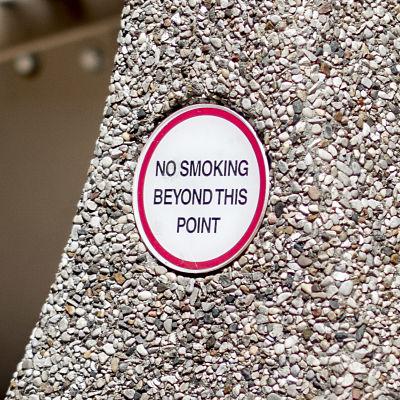New tobacco-free policy to take effect Aug. 1, 2017
Jackie Bavilacqua, coordinator of Health Services, explained that part of the reasoning behind the policy is to benefit student’s health in the long term.
“This is about protecting your lifelong health. When I think about our students, and my own daughter was a student at Trinity, and the kind of education they’re getting, and the potential they have in their life to contribute to the satisfaction of the world “¦ those who are using tobacco are cutting that potential short. They are limiting what they can do with their lives, and we want to change that. We know from information provided by the surgeon general that outlawing tobacco products reduces the number of people that smoke. So it’s not just about outlawing it on campus, it’s about reducing the number of people that smoke,” Bevilacqua said.
Katherine Hewitt, coordinator of wellness services, said that the policy is not meant to target those who smoke regularly.
“Our percentage of daily smokers on campus is pretty small. We had a feeling that this was the case, but we just got survey data back confirming that. Tobacco use is pretty low, it’s almost like it’s phasing out, so we know that we’re on the right track and that this policy should be sustainable,” Hewitt said.
Hewitt continued to explain that administrators are hearing positive feedback from former tobacco users.
“We have a lot of people who are excited about this policy who are former smokers, former tobacco users, so it’s great to see support from that angle,” Hewitt said.
On the other hand, some students, such as junior Katie Simms, are against the implementation of the policy.
“I know that it means well, but I feel like that’s going to be particularly unpleasant for those who smoke with frequency, especially rising seniors and juniors. I also saw a really good point about how the people who smoke more tend to be of a lower socioeconomic status, LGBT or are more likely to be affected by any number of mental issues, and smoking can be a kind of coping mechanism, and they’re smoking as a way to help deal with that. That’s definitely what it is for me and some other people that I know, so I’d say it’s a well meaning step in the wrong direction,” Simms said.
Simms explained that she believes the policy is overstepping.
“We’re all adults. Everyone here, with the exception of a very small percentage of people who aren’t 18 yet are old enough to purchase cigarettes, and I don’t think we need to be babied into things like this. We’re adults, we can make our own decisions and we don’t need someone holding our hands to make healthy or unhealthy choices,” Simms said.
The policy will be enforced by a task force of students and faculty.
“We will not have our TUPD officers issuing citations for this. That’s not the goal. It’s primarily that we want to be educational about it. In terms of enforcement, we’re developing a task force, which is very similar to what other campuses are doing to ensure that people are abiding by the policy. It’s just a handful of students, faculty and staff that will come together and will have some sort of general script that we’ll review to make sure that they’re comfortable approaching people and initiating that discussion. It’ll more or less look like a conversation about the policy with that person. It’s not going to be judgmental, it’s not going to be very biases, it’s just going to be them introducing themselves, making them aware of the policy, and the reasoning behind it. They’ll then give out a referral card with resources for the policy. To be fair, if people are not abiding by the policy, after a couple of discussions with the same individual, there will be a referral to conduct board. Hopefully it doesn’t get to that point, but there has to be a way to make sure that the policy is being abided by,” Hewitt said.
Simms found the notion of a task force to be misguided.
“That just doesn’t sound helpful. There have been plenty of times when I’ll be smoking a cigarette and someone will come up to me and tell me that it’s unhealthy and that I should quit. That hasn’t made a difference for me or really any of my friends. If anything all that happens is we walk away and light another cigarette somewhere else,” Simms said.
The goal is to discourage the use of tobacco, but some have expressed doubts that it will help people quit smoking.
“I’m probably not going to be living on campus next year, so maybe it’ll help me quit, but it’s definitely going to be a thorn in my side, especially when I’m stuck on campus on the really busy days and can’t stop to take a cigarette break. It’s a nice time, and often the only time that some of us are able to get up and get away from our work, and our computers, and things like that. Really to just have time away from a screen,” Simms said.
Bevilacqua explained that she sees it as an issue of helping students maximize their potential.
“Generally, young people who smoke aren’t going to experience a lot of problems with it “” as a young person. It’s as they get older that the prolonged effect of nicotine and the carcinogens that come along with tobacco smoke and that kind of thing that they start to see these problems. For every person that dies from a smoking problem, thirty thousand people live with a chronic illness because of it. Emphysema, heart disease, liver disease, all kinds of cancers are connected to tobacco usage,” Bevilacqua said.
The policy will take effect on Aug. 1, and will include all cigarettes, cigars, pipe tobacco, chewing tobacco, nicotine vapes and e-cigarettes.







